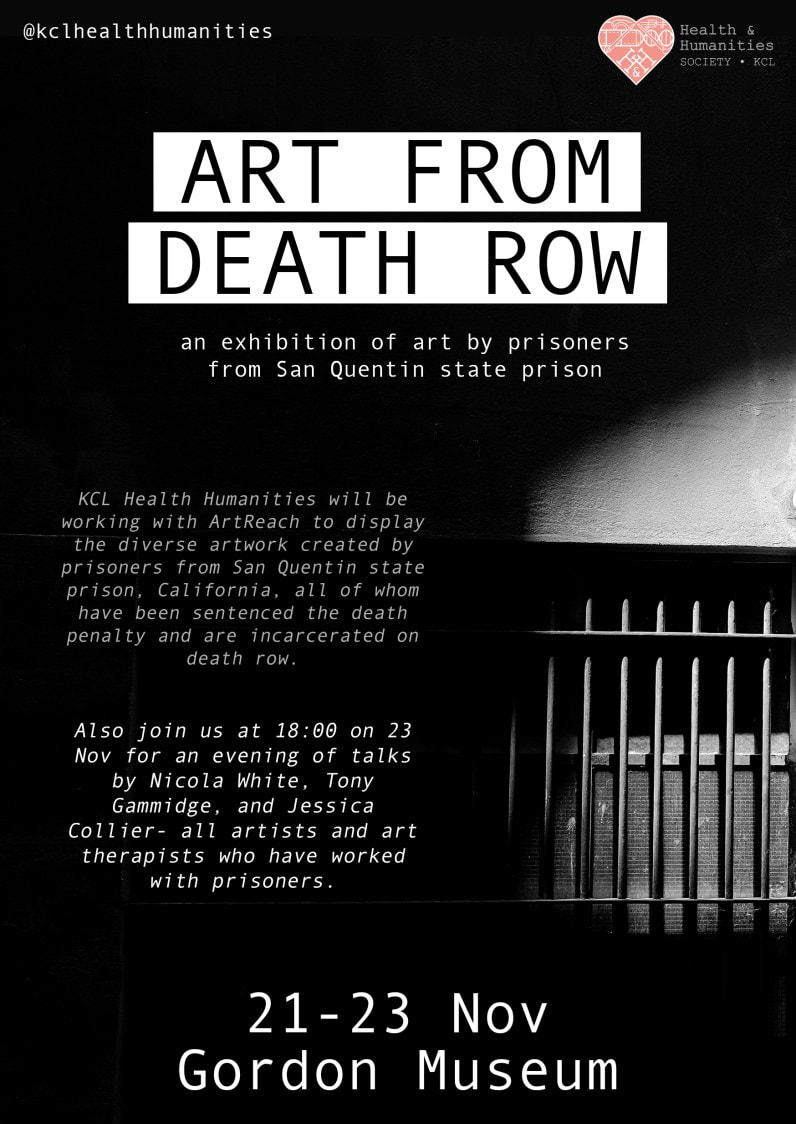|
20th - 23rd November 2017 - King's College, London Between 20th and 23rd November 2017, An exhibition of art & poetry from San Quentin's death row, curated by ArtReach , was displayed at King's College London by the King's College Health + Humanities Society who celebrate the diverse communal interests between health and the humanities. On Thursday 23rd November, there was an evening of talks at King's College, as well as an opportunity to view the artwork & poetry. Steve Champion (aka Adisa Kamara) gave an introductory talk via prison phone from San Quentin - telling a little bit about himself & his creative process as a writer - and also about his fellow inmates, the artists incarcerated on death row. You can listen to his talk here:- At the end of his talk, Steve recited a poem "Beyond the Walls" which he wrote whilst in Solitary Confinement. The poem in full is below:-
Beyond the Walls The dream hovers where even the senses can’t touch it. Separating itself from the mind, it dances upon the moonlit surface. Like art, unfathomable in its reach, rising like the morning mist, free, only to disappear somewhere in the vastness. Dancing to the mystic mind. Reaching, beyond the walls. Steve Champion (Adisa Kamara)
1 Comment
by Steve Champion - incarcerated on death row San Quentin since 1982 Below is an excerpt from a chapter of the memoir “Dead to Deliverance: A Death Row Memoir” written by Steven Champion, a former member of the Crips street gang who is on death row. Tom Kerr, associate professor of writing at Ithaca College, edited and published the book. The public, with its hunger for revenge, does not want to hear about personal acts of atonement by people who have been sentenced for a crime. Acts of atonement by the condemned are usually viewed as a ploy to save his or her own life — not as a genuine act of redemption. People on death row are deemed the lowest of the low. Many people believe death-row prisoners cannot be “reformed” because they are “unformed” as human beings. Executing the condemned is not viewed the same as killing a human — it is chalked up to society’s attempt to rid itself of its toxic waste. Proponents of capital punishment freeze condemned-to-die criminals at the worst moments of their lives; to justify their execution, they must be barred from redemption. But history is full of individuals who have made major mistakes but manage to turn their lives around and make significant contributions to humanity. Many religious people have mixed emotions about whether a murderer can be redeemed. But when it comes to biblical figures like Moses, King David and Saint Paul, they are quick to make exemptions. In fact, these figures are highly revered around the world precisely because society has determined that their contributions to humanity outweigh their crimes. Why are some people worthy of redemption while others are denied it? Why are death-row prisoners damned as unrepentant criminals incapable of transforming their lives? Redemption is not reserved for some. Redemption is a road map for reconnecting to one’s humanity. If redemption is not meant for people who have lost their way and hit rock bottom, then the word ought to be stricken from every dictionary. Redemption means regaining something you have lost through improving your life. Many people, in and out of prison, never atone for anything; they go to their graves defiant and unrepentant. A person who has the courage to look within himself and decide to transform his life ought to be encouraged, if not applauded. Some recent recipients of the Nobel Peace Prize were not always seen as champions of peace. In 2001, both Nelson Mandela and Frederik de Klerk became Nobel Peace Prize laureates. De Klerk was the head of an apartheid government that openly oppressed, discriminated against and murdered blacks, and considered Mandela a terrorist. Mandela once headed the guerrilla wing of the African National Congress, which believed in armed violence. In 1994, both Yitzhak Rabin and Yasser Arafat were awarded the Nobel Peace Prize for their efforts to create peace in the Middle East. Prior to receiving the Nobel Prize, Arafat was labeled a terrorist. Yitzhak Rabin was prime minister of Israel and sanctioned violence against the Palestinians. All of these people were viewed unfavorably in their lifetimes, but were able to transcend their mistakes — because society accepted the fact that they were not the sum total of their mistakes. No one is. The transformative power of redemption can change anyone who is sincere about changing. It makes no difference if a person lives in a temple in Tibet, an ashram in India or a prison cell on death row. Your location should not diminish the value of your redemption. Steven Champion has been on California’s death row for 36 years, since he was 18 years old. Originally published by the Ithacan in 2010
|
Adisa Kamara
Poetry, writing & Lessons in Life from San Quentin death row Archives
July 2019
Categories
All
Archives
July 2019
|

 RSS Feed
RSS Feed